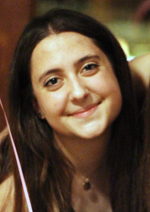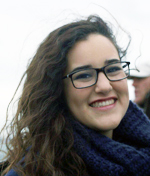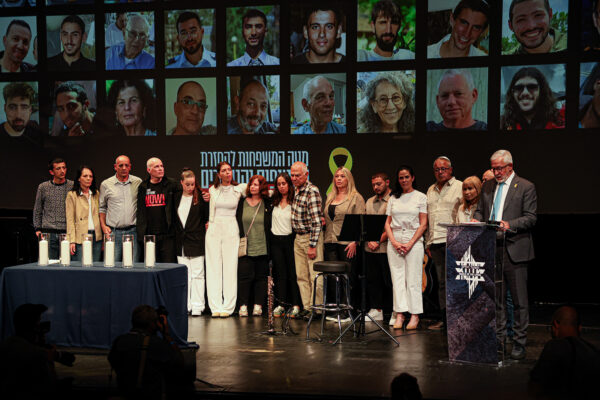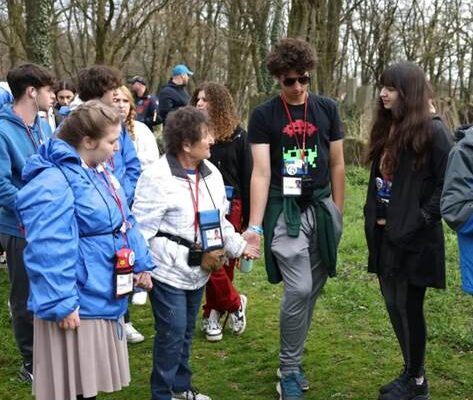
Participants of the March of the Living 2016 pose at the Auschwitz-Birkenau complex under the infamously cynical sign meaning “work makes you free”
SAN DIEGO — Two San Diego teens who participated in the March of the Living earlier this year–in which a visit to the German Nazi concentration camps in Poland is followed by a trip to Israel — reflected on the first of these experiences in these articles below. Questions about the March of the Living program may be directed to Marcia Tatz Wollner, western region coordinator for the March of the Living, at marcia@motlthewest.org
Why I Marched
By Gabrielle Katzenelson
I marched for Roman Myron Lubetzky.
I marched for my grandfather and for all of those who suffered his torture.
I marched for the 6 million Jews that were murdered, and for the 5 million other victims that endured the same fate.
I marched for my family, extended family, and for my Jewish brothers and sisters.
I marched for tolerance, peace, and respect.
I marched for remembrance.
I marched because we will never forget.
I marched so that this atrocity never happens again.
I marched for a safe country to call home, I marched for Israel.
I marched because we as a Jewish people are not going anywhere.
I marched because we are here to stay.
עם ישראל חי
*
Katzenelson is a 2016 graduate of Canyon Crest Academy, and will be attending New York University.
**
My Generation Does Not Understand the Holocaust
By Emily Arkin
What is the first term that comes into your mind when you think about the Holocaust? Common, acceptable answers are “Hitler,” “Nazis,” “World War Two,” “Jews,” “six million,” “Auschwitz,” “concentration camp,” and “death.” Some may recall a quote or fact from the overplayed, Hollywood, Holocaust movie their world history teacher played instead of lecturing on this unit. When asked to elaborate, the average American teen is often stumped. Other than the basic definition of a few “Key Concepts” from a textbook, the knowledge of this human catastrophe is severely stunted in our youth. Popular Hitler parody accounts on Twitter, however, have a combined 550,000+ followers. Anti-Semitism is far too prominent in high school culture. While we may know a few main facts, it is evident that my generation does not truly understand this tragic point in history.
In order to ensure the safety of future generations, it is imperative that students receive a quality education on this event in order to ensure that nothing similar happens again. More often than not, teachers shy away from personally informing students about the Holocaust in order to spare themselves and their students the emotional weight of such knowledge. My personal education on the Holocaust was only a slight improvement. A year of my Jewish education was dedicated to studying the Holocaust in the movie-watching format. While I knew a few more facts and cried to several more Holocaust movies than the average kid my age, the level of understanding was basically the same.
In an effort to further my knowledge and fulfill my inherent duty as a Jew, I chose to participate in The March of the Living. This trip took me through multiple concentration camps in Poland, leading up to a ceremonial march from Auschwitz to Birkenau in which ten thousand fellow Jews honor those who perished in the Holocaust. As I traveled through concentration camps and met with multiple survivors, I established an understanding that connected me to the Holocaust in a profoundly personal way.
Since my trip, I have struggled to process the things I saw and felt in Poland. Stories and words can never prepare you for what you’ll experience walking into a gas chamber, and no amount of emotional training can prepare you for the pain you’ll experience afterwards. When asked to discuss this tragic point in history, I no longer think of key words or phrases. Now when I think about the Holocaust, I am overcome by a series of flashbacks. An enormous hallway filled with human hair, the ashes still sitting in the crematoria, the way the my hand followed the scratches on the cold gas chamber wall, the trembling of my chest as I wept at the sight of a child’s slipper, standing out in a pile of 180,000 shoes, all rush through my mind as I scramble to verbalize the magnitude of this unimaginable massacre.
Perhaps the reason we struggle to comprehend the Holocaust is because it is almost impossible to grasp its gravity. I find myself mourning the lives of six million strangers. The Holocaust to me is the ghetto wall of Warsaw, the empty synagogue of Tykocin, the mass grave of children in Kielce, the gas chambers of Auschwitz, and the train tracks of Birkenau. It is the unfinished story of every life that ended prematurely due to terror and unjust hatred. It is one of the most horrific events in history and it is our job as human beings to stand in united opposition of prejudice and all those who would seek to take up the practice of genocide.
*
Arkin is a 2016 graduate of Patrick Henry High School and will be attending Brandeis University.
*
Originally published HERE










